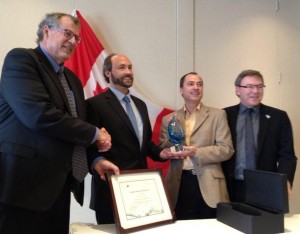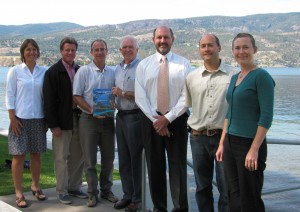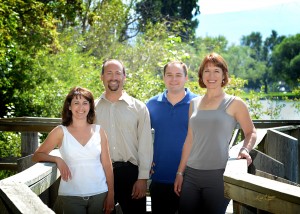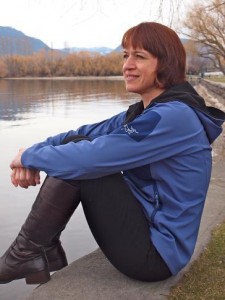“Why isn’t every day Water Day?” – Peter Gleick, on Twitter
Dear Readers,
Canada Water Week, and World Water Day (March 22) have come and gone, and I hope you all took the opportunity to lift a long, cool glass and marvel at the wonder and privilege to have such a beautiful, precious thing flow freely from our taps. Nonetheless, this seems a good opportunity to celebrate progress in the year past, to look at where we’ve fallen behind, and to make plans for the future.
First, I want to apologize for the long blog-drought on Building Bridges. Over the past few months I’ve been taking time for family: the short illness and peaceful passing of my father. He had a great love for this blog, and I often thought of him while writing – to educate and entertain an intelligent, caring member of the public. In that spirit, I continue.

Nelson Jatel receiving the Excellence in Water Stewardship Award on behalf of the Okanagan Water Stewardship Council
World Water Day was a time of celebration for the Okanagan. Our Okanagan Water Stewardship Council received a national award from the Council of the Federation (Canadian provincial and territorial governments) for Excellence in Water Stewardship.
The theme of 2013 was collaboration, and it was a joy to be recognized among the other great, collaborative projects happening around the country. The Okanagan Water Supply and Demand Project also got recognized for collaboration that week – with a write-up in Waters Next, a publication of Water Canada. Which all demonstrates the intense commitment of local folks and passionate people working away in all our government agencies – looking out for water in the Okanagan.
At the same time, there’s still a tremendous amount of things to do. Someone once asked me my vision of water sustainability, and I answered, “Water sustainability isn’t a place that you get to. The world is changing, much is unknown, and the important thing is to have people and processes in place to be ready.” This is also called “resilience.”

The editorial committee of the Okanagan Sustainable Water Strategy: (L-R) Anna Warwick Sears, Toby Pike, Bob Hrasko, Tom Siddon (founding Council Chair), Bernie Bauer (current Council Chair), Nelson Jatel, and Kellie Garcia.
We need drought plans, and flood plans, we need good information, and good people to act on these things. Nothing is going to get less expensive; in fact, we’ll be drawn tighter and tighter as needs grow. What are our priorities? How do we triage? What is the best way to pay for these things? How do we engage the public? The Okanagan Water Stewardship Council developed a Sustainable Water Strategy to help answer these questions, but it takes long-term persistent effort to get to the answers.
It was interesting to sit in on a webinar this week on the RBC 2013 Canadian Water Attitudes survey. Bob Sandford called in for colour commentary from his hotel in Aqaba, where he was attending a Rosenberg Forum on water policy in arid and semi-arid lands. While the rest of the world is struggling to protect quality and supplies, the survey found that average Canadians are less engaged than three years ago. How do we recapture that sense of urgency, when there are so many other issues for the public to be concerned about?

A small but enthusiastic team, moving things along at the Okanagan Basin Water Board. (L-R) Corinne Jackson, Nelson Jatel, James Littley, Anna Warwick Sears
My feeling is that we have a very strong, intelligent water community, and many of the answers will rely on getting better at this very basic level of communication. I was joking with Corinne Jackson, our Communication Director, that I am turning into a water communication zealot. She said, “Glad to have you on my team.”
Corinne is leading two incredibly ambitious campaigns this summer: “Make Water Work,” for home water conservation, and “Keep the Okanagan Zebra Mussel Free,” raising awareness about invasive mussels.
Over the past four months, I have slowly been collecting materials and stories to share, and look forward to continuing our conversation about BC water and the Okanagan watershed. Please comment on stories you like, and email me with more ideas. It’s going to be a good year.




There is a recent New York Times article about how knowing one’s family history makes one more resilient. Maybe water managers need to immerse themselves in the history of their watersheds? To develop resilience?
I am sorry to hear that you have lost your Father, but it sounds like he is very much a part of you and vise versa….how wonderful to have had such a special relationship.
We want to thank you for the hard work by so many on the excellent Soils Toolkit. How true that the soil is key to water sustainability.
One of our members came up with an idea for a bumper sticker..”Don’t Trade Water for Gold”. We think though, in our situation at Twin Lakes, it would be too political – can you think of a place for such a true statement?You mentioned 3 years ago the interest in water was greater..we were in dry years and could see the depletion happening around us so we were concerned and very interested in water. Now, though, with the past wet years we quickly forget.
We, the Lower Nipit Improvement District, are still concerned about ground water legislation for all. How else can we assess water use and sustainable water allocation?
Coral Brown